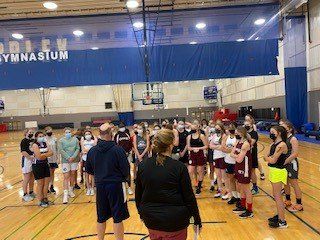Belief
What Makes an Athlete Confident?
In my first year of coaching I was working as an assistant coach with my old high school in Halifax, Nova Scotia. We were ranked second in the province and were preparing for our regional final against the number one team. The winner would head to provincials as the over-all number one seed. At the time we had a post player who started at the 4 spot for us. He was 5'10" and weighed roughly 140 pounds, he was rail thin, but very athletic. He constantly walked around the gym saying in a very loud voice, "I am unstoppable, I am the best big man in the province!" For context the team we would play in the regional final started three players on the frontline, that were 6'8", 6'6" and 6'5". The 6'8" player was the de facto best player in the province and the most sought after recruit for university and our 5'10" player, who was giving away about 60 pounds as well as the height would have to guard him. In the end our four player would be blocked more then 8 times attacking the net, we lost count after that. He would, however, finish with 17 points, 13 rebounds and foul out his 6'8" counterpart as we shocked the number one team on their own floor and went to provincials as the number one seed. It was a great performance and one that made you think, why is that some people, even in the face of overwhelming odds, or overwhelming evidence, still truly believe that they will succeed? It is a crucial question especially in a province where that lack of believe has become endemic and constantly limits our ability to achieve at the national level and off island.
When I first came to Newfoundland it was an interesting time. The evidence at that time was that we could not compete nationally. The university teams had never made the play-offs, the women's provincial teams were in the midst of a decade long run without a single win against another provincial team. All the evidence at the time seemed to indicate that in fact our athletes could not compete. What I found however, was a group of very talented players who were desperately looking for someone who would share their belief that they were capable. Because of that we were ideally situated to change our circumstances. Once the feeling was held that I believed what the players believed they were willing to hear the messages that were broadcast and make the necessary changes for us to compete. That led to a roughly 15 year window where women's basketball in Newfoundland flourished and achieved at a very high level, both provincially and at the university level. That time frame produced 7 AUS championships a national bronze medal and the only national medal for Newfoundland in the U17 age group, as well as a best ever 4th place finish at Canada Games in 2001 under Tami Pennell.
We now had a ton of evidence that Newfoundland and Labrador could in fact compete nationally and that we could produce talent that was as good as any other province. It would seem that the province should have continued to build on their belief in this area and we should only have gotten better. Instead, a weird thing happened on the way to the gym. Players became less sure about themselves. More nervous about their ability to compete and our performances began to crumble. Rather then watch our teams success and build a belief based on, "if they can do that, so can I!" Instead, players looked at it and said, "I will never be as good as them, I cannot possibly compete at that level." The low point of this would be when we took a U15 team to nationals, we would open against Alberta, who would go on to play in the national final and handle them relatively easily. the next day we would play Saskatchewan, knowing a win against a team that was much weaker then Alberta would send us to a national semi-final. We would shoot an unbelievable 16% from the floor missing wide open 3's and lay-ups as we lost 39-36 and then lost to a relatively weak Quebec team that evening to wind up playing for 9th place. We were easily the second best team at nationals but did not believe that we could compete. Even when given overwhelming evidence that we could in fact compete we rebelled against the notion. That leads to the very interesting question, where does belief come from? What makes an athlete believe that they can achieve?
There was a study of Olympic athletes who won gold medals. They were asked questions about their training, routines and preparation. In the end as one might expect there was real diversity in how athletes trained and prepared. However, there was one commonality between all athletes that won a medal at the Olympics. That commonality was positive self talk. In the minutes leading up to performance the athletes would be saying to themselves that they were great, that they would dominate the competition and they were obviously the best in the world at what they did. Much the same as our high school 4-player who talked themselves into success, every elite athlete in the world had the same routine. The thing about your brain is that it cannot differentiate between what it says to itself and what someone else says to it. Physiologically it has the same impact on your body. In that regard you can be your own hype person, you are capable of ramping up your body to perform well. The first step toward believing in yourself is simply that, telling yourself that you will succeed.
Once you are ready to play then comes the actual competition, and as everyone knows there are any number of occurrences in a game that might cause one to question their will or ability to succeed. What are the elements that allow a player to sustain their belief in these situations. First and most importantly is physical training. The better physical shape that I am in, the more likely I am to believe that I will succeed. In almost every situation that I have encountered with a player that had troubles staying confident through competition, when they improved their physical fitness these "yips" went away. The biggest change we made at the university level when we took over was related to the physical conditioning of our athletes. We were not in good shape and as a result when the tough point in a game came, we were able to doubt our ability to "finish" and leave a window open for the competition to climb in and defeat us. As we changed the conditioning of our athletes we closed this window and our players had a natural boost in their belief related to their improved fitness. They believed that they were well prepared and had no reason to doubt their ability based on how their body felt and how well they could handle the physical demands of the game. Conversely, later in the program's timeline fitness became more of a struggle and athletes were less likely to prepare. They were more likely to doubt themselves because their body was not ready for the demands of the competition. They were not ready to hear the message of physical preparation. Changing this element is crucial.
The final step is similar top the previous one, I have heard it repeated continually by professional and local athletes, and teams at all levels. It relates to the work and demands placed on them in practice. You want practice to be tougher then the games. When this is the case you build a bond between the athletes and the work. What you hear repeated again and again is the notion that the athlete did not go through everything that they endured just to come up short in competition. The bond of the work with the athlete is what builds that final wall against failure. The notion that the athlete did not sacrifice all the things that they sacrificed, work as hard as they worked and endured the deprivation of training just to come up empty at the big moment pushes many athletes through to success. You need to ensure that the challenges of practice are tough enough to ensure that the athlete has that final belief in their body that they will succeed, that their is no situation they have not prepared for, and have given up too much to come up empty. As a coach you need to ensure you are creating a safe, but challenging environment, while as a player you need to ensure you are attacking every practice at maximum effort.
The combining of these three elements, positive self talk, physical fitness, and sacrifice is what makes for a confident and prepared athlete. The job of any successful coach is to integrate these elements into your training schedule and ensure your athletes are building a platform of belief for their accomplishments. There are levels of youth sport where simply having the most talent is sufficient to carry you through to a championship. A platform of long term success at multiple levels requires a plan to integrate all of these elements into your system and training.
Join Our Mailing List
Thank you for joining the NLBA Mailing List.
Stay tuned for some great content from the NLBA.
Oops, there was an error submitting your message.
Please try again later.

